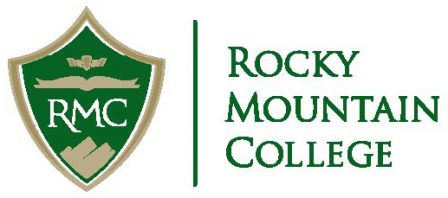Satisfactory Academic Progress
March 18, 2022 2024-02-14 22:49Satisfactory Academic Progress
Satisfactory Academic Progress (SAP)
Satisfactory Academic Progress (SAP) ensure that you are successfully completing your coursework and can continue to receive financial aid. Any student enrolled at RMC who receives any type of aid (Federal Title IV financial aid and RMC institutional scholarship, grants, and work study funds) are required to meet SAP standards.
Federal regulations and Rocky Mountain College policy require students to maintain satisfactory academic progress toward degree completion. New students, including transfer students, while subject to SAP, are not measured for satisfactory progress until grades have been posted for the first term of attendance at RMC. The following standards represent the minimum performance requirements to receive financial assistance and do not necessarily coincide with individual academic program requirements.
There are three components to the SAP standards:
1. Minimum cumulative grade point average (GPA);
2. Successfully completing a degree at the required pace;
3. Completing a degree within an established time frame.
Satisfactory Academic Progress (SAP)
1. Minimum Cumulative GPA
In order to determine students’ scholastic averages, grade points are awarded for each hour of credit as follows: “A” – 4 points; “B” – 3 points; “C” – 2 points; “D” – 1 point; “F” – 0 points. A plus (+) or minus (-) does not change the value of the grade for the calculation of the GPA. Undergraduate students must maintain a cumulative GPA of at least 2.00. Graduate students must maintain a cumulative GPA of at least 3.0. Students must meet this qualitative standard in addition to the quantitative standards below.
2. Pace
Students must complete at least 67% of all credits attempted. Pace is measured by dividing the cumulative number of earned credit hours by the cumulative number of credit hours the student has attempted at the end of each academic period. Attempted credits are described by the number of credits at the end of the drop/add period for each term.
3. Time Frame
Federal regulations state undergraduate students must complete their degree objective within 150 percent of the published length of the educational program. For example, a student enrolled in a bachelor's degree program requiring 120 semester credits in order to graduate could attempt up to 180 credits before federal student financial aid would be terminated.
Monitoring Progress
Financial aid satisfactory academic progress at RMC is measured at the end of each academic term. The overall cumulative grade point average (GPA), pace, and maximum time frame assessment will be based on the student's entire academic record.
Failure to Maintain Satisfactory Academic Progress
Students will be notified in writing if they have failed to meet the above standards. Written notice will be sent for the reasons listed below.
- Financial Aid Warning: A student is placed in a warning status the first time he or she fails to meet the above standards. A student on financial aid warning may continue to receive financial aid, with the exception of work study, for one academic term. A student does not need to take any action at this point unless he/she wishes to participate in the work study program while in the warning status. Work study termination may be appealed in writing to the director of financial aid. At the end of the warning period, a student's satisfactory progress will be evaluated again. If it is determined that the student is meeting the minimum progress standards, the student will be considered to be in good standing and may continue to receive financial aid.
- Financial Aid Termination: If the student fails to meet the minimum satisfactory academic standards after the warning period, aid will be terminated for the subsequent academic term. Financial aid, including work study, will be terminated for students with less than a 2.00 cumulative GPA after four semesters of attendance. The Academic Standards Committee may place a student on academic suspension if their term GPA is less than a 1.00. If a student is suspended for this reason, their aid will be terminated as well. If a student repeatedly withdraws from classes, financial assistance is terminated immediately when it is determined to be mathematically impossible for the student to be able to complete their degree objective within 150 percent of the published length of the program. Aid is also terminated for students who are dismissed from RMC.
- Regaining Financial Aid Eligibility: Students whose financial aid has been terminated may regain eligibility for financial assistance by re-establishing the required GPA and/or completion ratios using their own resources. If a student regains satisfactory progress, they may receive financial assistance for the academic period in which they regain eligibility, but not for any academic term in which the student did not meet the standards. It is the responsibility of the student to notify financial aid personnel when he or she has re-established satisfactory academic progress.
Right to Appeal
Financial assistance terminations, like academic suspensions, may be appealed. Generally, appeals will be granted for extraordinary circumstances beyond the student's ability to control, such as those described below. Appeals must be in writing and submitted to the director of financial assistance by the following dates:
• October 1 for the fall semester
• March 1 for the spring semester
The Academic Appeals Committee must grant academic reinstatement to students on academic suspension before the Financial Aid Office will consider an appeal for financial aid eligibility reinstatement.
The appeal should include a personal statement that clearly details the circumstances that hindered the student's academic performance, how the circumstances have been resolved or managed to permit the student to meet the standards, and relevant documentation should accompany the appeal form. Acceptable reasons to appeal include, but are not limited to: illness or injury of the student, illness or death of an immediate relative of the student, divorce or separation of the student, etc. Relevant documentation may include a physician's letter, hospital records, death certificate, obituary, or court documents.
A student whose aid is terminated due to maximum time frame or credit limit must clearly detail what circumstances prevented their graduation within the applicable time frame or credit limit, what coursework is needed to complete the degree with their appeal, and how long it will take to complete the degree. Acceptable reasons to appeal maximum time frame include, but are not limited to: change of major, transfer credits that did not apply toward your degree/program, etc.
If you have experienced extenuating circumstances that prevented you from maintaining satisfactory academic progress, please complete the Financial Aid Satisfactory Academic Progress Appeal Form.
The appeal will be reviewed by the financial aid director and staff. All decisions of the SAP appeals committee are final.
- If the appeal is approved and it is determined that the student should be able to make satisfactory progress during the subsequent academic term and meet the SAP standards by the end of the subsequent academic period, the student will be placed on financial aid probation and will be eligible to receive financial assistance, with the exception of work study, for one academic term. At the end of the probationary period, a student's satisfactory progress will be evaluated again to determine continuing eligibility.
- If the appeal is approved and it is determined that the student will not achieve the minimum SAP requirements within one academic term, they will be placed on financial aid probation and required to complete an Academic Recovery Plan (ARP) outlining how, if followed, the student will achieve the minimum academic standards, as well as a time frame in which the student expects to be back in compliance with SAP standards. Students approved on an ARP will complete and sign the plan with the Director of LEAP. The plan will be recorded in the Financial Aid Office and progress toward meeting the goals of the ARP will be monitored at the end of each academic term. If a student is not academically progressing as planned, financial aid will be terminated.
The student's responsibilities during a probationary period include successfully completing the appropriate number of credits and earning a cumulative GPA of at least 2.00 by the end of the probationary term.
Considerations and Additional Information
RMC also expects students to complete their degree within a reasonable time frame. Institutional assistance is available to full-time students up to the number of semesters it would take to normally receive the degree they are seeking. If a student is in a four-year program, institutional aid will be granted for four years. Students can appeal this institutional aid policy if they have planned carefully and successfully completed 15 to 16 credits per semester, but still need an additional semester or two to complete their degree.
The following are considered when evaluating a student's satisfactory academic progress:
- Grades of A, B, C, D, and P are considered attempted and successfully completed. P grades are not factored into the qualitative component of the SAP calculation, but the course does count toward the quantitative measure. Grades of I, IP, W, F, and NP are considered to be courses attempted but not successfully completed. I, IP, NP, and W grades do not affect the cumulative GPA, but they do reduce the completion ratio (pace) and are considered in hours attempted toward the maximum time frame. An "I" grade must be made up within one year. If a student successfully completes the coursework within one year, the actual grade will be registered, the student will receive credit for the course, and the new grade will be factored into the SAP components. IF it is not made up within one year it will be permanently recorded as an "F." F grades negatively impact all SAP measurements.
- Audit classes are not considered in SAP measurement.
- Remedial courses count toward enrollment status in the term in which they are registered, but do not count toward total credits attempted and completed. Grades earned in remedial classes are included in the student's cumulative GPA calculation.
- Transfer credits that are accepted by RMC are included in the calculations to determine a student’s cumulative GPA as well as attempted and earned hours.
- All grades earned, credits attempted, and credits completed are included in the SAP determination even if the student has changed majors.
- Students seeking to earn additional degrees will be placed into the grade level progression based on the number of credits accepted toward the additional degree and financial aid eligibility will be based on the grade level determined in this way.
- All academic terms of a student's enrollment count when assessing progress, even terms in which the student did not receive Title IV or institutional funds.
- Students may receive Title IV funding for repeating a class they previously failed for an unlimited number of times. If a student repeats a failed class and successfully completes it, the student will receive credit for the course, and the new grade will be factored into the SAP components. Students may receive Title IV funding for one repeat of a previously passed course. If a student repeats a previously passed course, the newest grade will be registered and will be factored into the SAP components.
Contact
Prescott Hall
Lower Level


